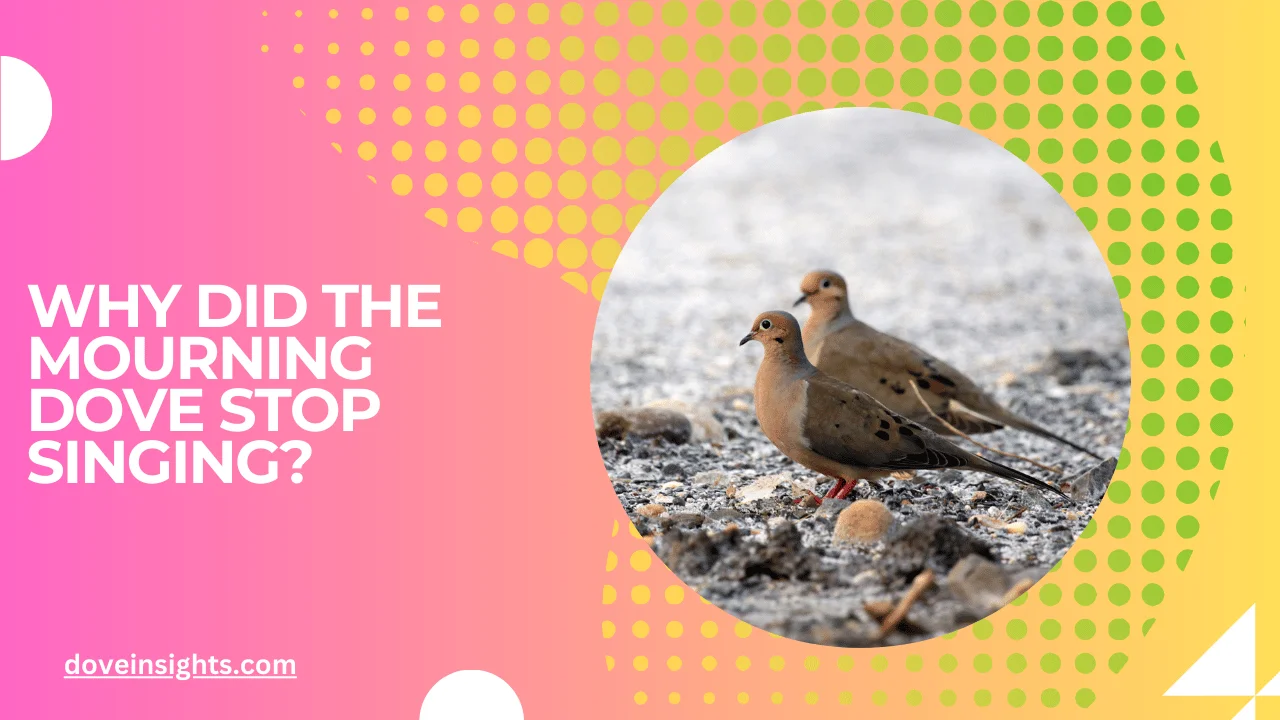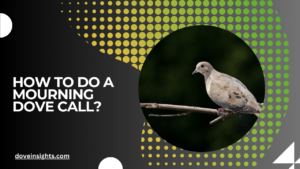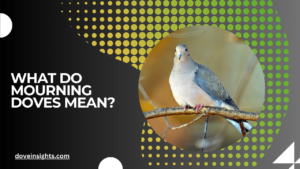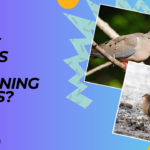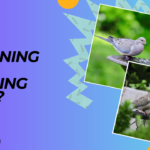Have you ever sat quietly in your backyard, listening to the peaceful sounds of nature, when suddenly the familiar coo of a mourning dove disappears?
That soft, melodious call, once so soothing, is now eerily absent. It’s a strange feeling, isn’t it? A kind of silence where there was once a comforting sound. Mourning doves are beloved for their gentle, mournful songs, but what happens when they suddenly stop singing?
If you’ve noticed this silence, you’re not alone. Mourning doves, like many birds, often stop vocalizing for reasons that are not immediately obvious.
This article will explore the various reasons behind this silence, from seasonal changes and territorial behavior to environmental factors and health issues. Understanding why mourning doves stop singing can help bird watchers and nature enthusiasts gain deeper insights into the behaviors of these remarkable creatures.
Whether you’ve noticed the silence yourself or are simply curious about the nuances of bird behavior, read on to uncover the mystery behind the mourning dove’s quiet spell.
Contents
- 1 Seasonal Changes and the Mourning Dove’s Vocalization Patterns
- 2 Territorial Behavior and Silence in the Wild
- 3 Environmental Factors and Habitat Changes
- 4 Health Issues and Physical Conditions
- 5 The Impact of Human Activity on Mourning Dove Behavior
- 6 Conclusion:
- 7 FAQ’s
- 7.0.1 Why did the mourning dove stop singing?
- 7.0.2 Do mourning doves only sing during breeding season?
- 7.0.3 Can environmental changes cause mourning doves to stop singing?
- 7.0.4 Is it normal for mourning doves to stop singing during winter?
- 7.0.5 Can health problems cause a mourning dove to stop singing?
- 7.0.6 Does human noise affect mourning dove behavior?
Seasonal Changes and the Mourning Dove’s Vocalization Patterns
One of the most common reasons mourning doves stop singing is due to seasonal changes. Like many birds, mourning doves have specific times of the year when they are more vocal and times when they become quieter.
Spring and summer are typically the most vocal periods for mourning doves, as they are in their breeding season, calling to attract mates and establish territories.
However, as the mating season ends and cooler weather sets in, mourning doves’ vocalizations decrease. During the fall and winter months, these birds focus more on survival and finding food, which leads to a reduction in singing.
The quiet periods that follow are simply a part of their biological rhythm. For mourning doves, it’s not unusual to experience extended stretches of silence during colder months or when they are no longer actively courting or defending their territory.
Territorial Behavior and Silence in the Wild
Another major factor behind a mourning dove’s silence is its territorial behavior. During the breeding season, males are particularly vocal, using their calls to claim territory and ward off rival males.
These calls, which sound like soft “coo-COO-coo” sounds, can be heard from dawn until dusk, often echoing through suburban neighborhoods and rural areas alike.
However, once the breeding season concludes, the need for territorial defense diminishes. In this post-breeding phase, mourning doves tend to become quieter because they are no longer as aggressive about protecting a specific area.
Without the pressures of defending territory or attracting mates, they may stop calling as frequently or altogether. This natural behavior is simply a sign that the dove’s primary function in that season has been completed.
Environmental Factors and Habitat Changes
Changes in the environment can also play a significant role in why mourning doves stop singing. Weather patterns, in particular, can cause mourning doves to become quieter.
Cold fronts, heavy rain, or high winds can lead to a reduction in vocalizations, as doves may retreat to more sheltered areas where they feel safer and more comfortable.
In addition, the loss of habitat or a disturbance in their environment can also lead to a sudden silence. If mourning doves are forced to move due to urban development, construction, or deforestation, they may stop singing while adjusting to their new surroundings.
These changes can cause temporary stress in the birds, leading to a change in their behavior, including reduced vocal activity.
Health Issues and Physical Conditions
While mourning doves are generally hardy creatures, health issues or physical conditions can sometimes affect their ability or willingness to sing.
Like all animals, mourning doves are susceptible to illness, injury, or parasites. If a mourning dove is injured, or experiencing discomfort due to illness, it may become less vocal or stop singing altogether.
Infection, such as respiratory problems, or internal parasites could cause a mourning dove to remain silent as it focuses on resting and recovering. Similarly, the bird may avoid calling in order to conserve energy if it is sick or physically compromised.
In these cases, a noticeable change in behavior, like a sudden cessation of vocalizations, can be a sign that something is wrong.
The Impact of Human Activity on Mourning Dove Behavior
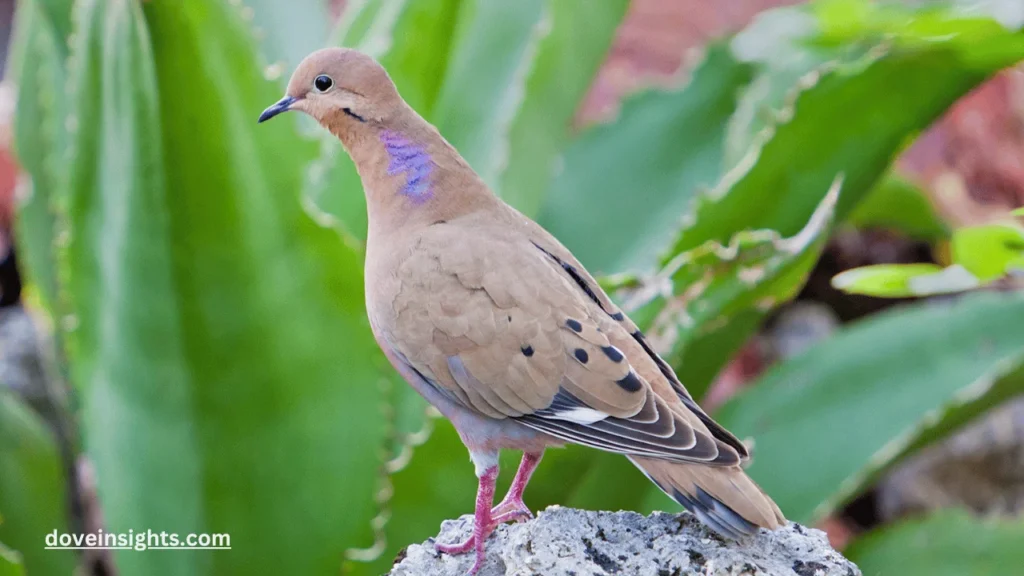
Human presence and activities can also play a role in the mourning dove’s decision to stop singing. Urban noise pollution—such as traffic, construction, or loud machinery—can drown out a mourning dove’s calls and reduce the frequency of their singing.
Doves, like many birds, rely on sound for communication, especially during breeding seasons when attracting mates is essential.
In addition, habitat disruption due to human activities—such as deforestation, urban expansion, or changes in agricultural practices—can force mourning doves to move to quieter, less disturbed areas.
As they adjust to new environments, their vocalizations may decrease or temporarily stop. These changes are often subtle but reflect how sensitive mourning doves can be to human-influenced environments.
Conclusion:
When a mourning dove stops singing, it’s often a natural response to changes in the environment, seasonal cycles, or even personal health.
Whether it’s the end of the breeding season, an environmental shift, or health issues that cause the dove to fall silent, understanding these factors helps us appreciate the complexity of bird behavior.
For bird watchers and nature enthusiasts, the silence of a mourning dove shouldn’t be seen as a cause for concern, but rather as a reminder of the intricate rhythms of the natural world. As these birds adapt to their changing surroundings, their vocalizations will likely return with the next season.
In the meantime, we can all take a moment to appreciate the quiet moments and the beauty that mourning doves bring to our ecosystems—whether they are cooing or not.
FAQ’s
Why did the mourning dove stop singing?
Mourning doves stop singing for several reasons, including the end of the breeding season, changes in weather, habitat disturbance, or health issues.
Do mourning doves only sing during breeding season?
Mourning doves are most vocal during the breeding season, particularly when males are trying to attract mates and defend their territories. Once the season ends, their singing typically decreases.
Can environmental changes cause mourning doves to stop singing?
Yes, factors like extreme weather, loss of habitat, or disturbances can cause mourning doves to become quieter as they adapt to their surroundings.
Is it normal for mourning doves to stop singing during winter?
Yes, mourning doves often stop singing in winter months as part of their natural cycle, focusing on survival rather than mating or territory defense.
Can health problems cause a mourning dove to stop singing?
Yes, illness or injury can cause mourning doves to stop singing, especially if they are conserving energy to recover.
Does human noise affect mourning dove behavior?
Yes, urban noise from traffic, construction, or machinery can drown out mourning dove calls, leading to less frequent vocalizations.

